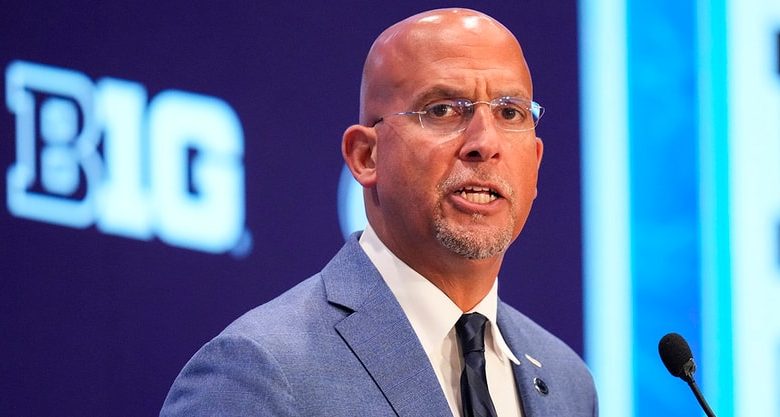James Franklin Fires Shots at SEC and Notre Dame, Questions Scheduling Fairness and Calls for Accountability Across College Football Landscape

Penn State head coach James Franklin is no stranger to voicing strong opinions about college football’s shifting dynamics. This week, Franklin turned heads again by taking pointed shots at both the Southeastern Conference (SEC) and Notre Dame regarding what he perceives as scheduling inequities across the sport. Speaking candidly during Big Ten Media Days, Franklin criticized the lack of consistency in scheduling practices and argued that elite programs should be held to the same standards when it comes to strength of schedule.
The comments quickly gained traction in national media circles, as they directly challenge two of college football’s biggest brands—the SEC as a whole, and Notre Dame as a prominent independent powerhouse. Franklin’s critique comes at a time when the College Football Playoff expansion and increased scrutiny of non-conference scheduling are forcing coaches and athletic directors to reassess competitive balance.
Franklin’s Comments Spark Controversy
When asked about Penn State’s approach to scheduling tough opponents, Franklin didn’t hold back.
“We’re trying to build a program that’s built to win national championships,” Franklin said. “But we’re also playing nine conference games, and then we’re scheduling teams like Auburn, West Virginia, and Virginia Tech. Meanwhile, you’ve got SEC teams playing eight conference games and three cupcakes. And Notre Dame? They don’t even play in a conference. Yet they’re still in the Playoff conversation every year.”
Franklin’s blunt assessment struck a nerve with fans across the country, especially those aligned with SEC programs or Notre Dame. But for Franklin, the message was less about stirring controversy and more about advocating for competitive equity.
Targeting the SEC’s Scheduling Model
The SEC has long faced criticism for its scheduling model, which includes just eight conference games and often allows for multiple non-conference matchups against Group of Five or FCS opponents. Franklin’s frustration lies in the fact that Big Ten schools play nine conference games and are often encouraged to schedule difficult non-conference opponents in addition.
Franklin argued that this imbalance hurts schools like Penn State in national perception and ranking comparisons.
“It’s frustrating when we’re judged by the same metrics, but we’re playing a different caliber of schedule,” Franklin added. “There has to be some standard across the board if we’re going to expand the Playoff and make this sport as fair as it can be.”
His remarks come just months after the SEC declined to move to a nine-game conference schedule, a decision that many coaches in other leagues saw as a way to preserve bowl eligibility and protect playoff contention.
Notre Dame’s Independence in the Crosshairs
Franklin’s critique of Notre Dame centered on the Fighting Irish’s unique status as an independent in football. While Notre Dame does have scheduling agreements with the ACC and frequently plays traditional rivals like USC, Stanford, and Navy, Franklin questioned whether their path to the College Football Playoff has been too forgiving.
“They play who they want, when they want,” Franklin said. “And I understand the tradition and the brand, but we’ve got to be honest—how does that fit in the new college football landscape where everyone else is grinding through conference gauntlets every week?”
Notre Dame, currently led by Marcus Freeman, has pushed back against joining a conference despite ongoing changes in college football, including realignment and Playoff expansion. The school has historically defended its scheduling strength and national appeal, often citing a diverse and challenging slate of opponents.
But Franklin’s remarks put renewed focus on whether Notre Dame’s independent model still aligns with the competitive expectations of modern college football.
Reactions Around the Country
Franklin’s comments drew both support and criticism across social media and sports talk shows. Some applauded the Penn State coach for speaking out against what they view as longstanding imbalances in college football’s structure.
“James Franklin is 100% right,” tweeted one analyst. “The SEC protects its brands, and Notre Dame gets a free pass. It’s time for change.”
Others, however, felt Franklin was making excuses for his own team’s shortcomings.
“Maybe win a Big Ten title before throwing stones,” a rival Big Ten fan wrote. “Penn State hasn’t exactly been tearing it up in the Playoff race.”
Big Ten vs. SEC: A Growing Rivalry
Franklin’s comments also underscore the growing tension between the Big Ten and the SEC, especially with both conferences set to expand in 2025. With USC, UCLA, Oregon, and Washington joining the Big Ten, and Texas and Oklahoma entering the SEC, the race for conference superiority is heating up.
Each league now boasts premier programs and TV deals that rival or surpass those of professional sports leagues. As such, the stakes are higher than ever, and scheduling has become a major flashpoint in the debate over fairness and legitimacy.
Franklin sees the expansion as an opportunity to level the playing field.
“With more at-large spots in the expanded Playoff, it’s going to be more important than ever that we’re comparing apples to apples,” he said. “Right now, we’re not.”
Playoff Expansion Heightens Scrutiny
The College Football Playoff is set to expand to 12 teams, and the selection committee will face more complicated choices as they evaluate resumes from multiple conferences and independent programs. Franklin’s comments serve as a preemptive challenge to that committee: don’t reward teams that haven’t played the toughest possible schedules.
In a system where only a few losses can ruin a season, teams like Penn State feel the pressure to schedule smartly—but also competitively.
“We don’t want to be punished for doing things the right way,” Franklin said. “If we’re playing high-level opponents and finishing 10-2, that should mean more than 11-1 against a weak slate.”
A Call for Standardization?
Franklin’s solution? A more standardized approach to scheduling, perhaps even a mandate from the Playoff committee that encourages or requires certain scheduling practices—such as a minimum number of Power Five opponents or even a uniform number of conference games.
While such a system would be difficult to enforce, the idea is gaining traction among coaches who feel that the current landscape is too fragmented.
“We’re not asking for a total overhaul,” Franklin said. “But if we want to crown a true national champion, we’ve got to agree on what that path looks like.”
What’s Next for Franklin and Penn State?
As the 2025 season approaches, Franklin knows that talk must be backed up by results. Penn State returns a talented roster, including quarterback Drew Allar and a defense expected to be among the Big Ten’s best. With Michigan and Ohio State continuing to dominate headlines, Franklin hopes his team can break through the glass ceiling and make a legitimate Playoff run.
If they do, he’ll feel even more justified in demanding that other elite programs face similar tests on the road to glory.
In the meantime, Franklin’s comments will continue to stir debate—and perhaps push the sport one step closer to scheduling parity.
James Franklin’s shots at the SEC and Notre Dame may seem controversial, but they reflect a deeper truth many coaches share: college football’s future depends on fairness, transparency, and accountability. Whether or not those ideals take hold remains to be seen.









